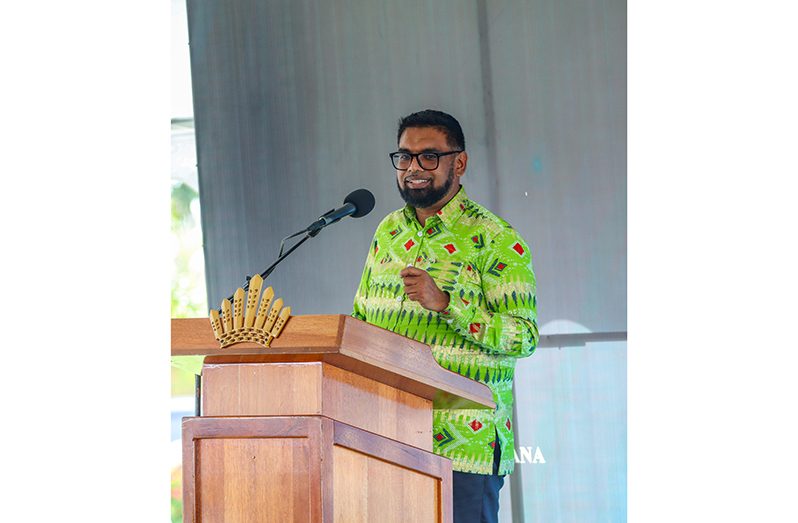– President Ali announces; says it will pave way for greater accountability, efficiency
TO improve public service delivery, President Dr. Irfaan Ali has announced the establishment of a central monitoring mechanism aimed at increasing accountability, transparency, and efficiency within Guyana’s public sector, especially in the different ministries.
The initiative, unveiled during the launch of the ‘One Guyana Digital’ project at the Arthur Chung Conference Centre, is part of the government’s broader strategy to modernise and streamline service delivery, ensuring that it meets the citizens’ needs and expectations.
Under the leadership of the People’s Progressive Party/Civic, the new system will feature a national call centre, providing a direct line for citizens to voice their experiences and concerns regarding the quality of public services.
This approach not only aims to facilitate easier access to government services but also intends to foster a closer connection between the government and the populace.
President Ali highlighted the importance of migrating government services to digital platforms to alleviate common issues faced by citizens, such as difficulty reaching government agencies via phone.
“Many of you complain, you call a ministry; you can’t get anyone. So, we’re now trying to migrate a lot of the government services into digital platforms. This will ensure greater connectivity, efficiency, and satisfaction in the delivery of services,” he stated.
The call centres are anticipated to bring about a revolution in the delivery of government services, making them easier to access and more user-friendly.
The initiative seeks to restore trust in the government’s dedication to serving the public effectively by removing the typical challenges citizens encounter when engaging with government organisations.
President Ali expressed optimism about the project’s impact, highlighting the potential for reduced headaches and frustrations for both government officials and citizens alike.
“And for me, there is less headache and less cuss. And I can do with less headache and less cuss,” he added, reflecting on the anticipated benefits of the new system for all parties involved.
President Ali emphasised that the implementation of this central monitoring mechanism is a crucial move in modernising Guyana’s public sector. It aligns with his government’s vision of establishing a more accountable, transparent, and efficient system that prioritises the well-being and needs of its citizens.
Last year, President Ali, while delivering the feature address at the La Primavera Banquet Hall in Ontario, said that Guyana is on track to undergo a remarkable transformation as it aims to build a world-class service sector with a strong emphasis on creating a unique national brand and harnessing advanced technologies.
Addressing the misconception that Guyana should replicate the development strategies of other countries, President Ali said: “What is wrong with us developing our own model? We must have the ability to design and propel our own brand. That is what is going to make us different.”
President Ali further underscored the importance of identifying the core values, principles, and societal structure that define the Guyanese identity and recognising these “soft issues” as fundamental to building lasting prosperity.
To fulfill its vision, the government acknowledges the necessity of modernisation and the integration of advanced technologies, he pointed out.
President Ali highlighted the crucial role of upgrading Guyana’s records management system, incorporating biometrics, electronic identification cards, and passports while embracing robotics and other cutting-edge technologies.
Despite the associated costs, the President expressed the urgency of harnessing available technology to propel Guyana, stating, “We have to transform everything that we have learned to do all our lives onto an electronic platform.”
The PPP government has long shown an interest in digitisation and the telecommunications sector.
The 2016 Telecommunications Act was brought into force in October 2020 by President Ali when he was elected to government, which ended the over 30-year monopoly held by the fixed-line incumbent, Guyana Telephone and Telegraph (GTT).
This later set out a framework for enabling competition across all segments of the telecommunications sector in Guyana. The government has encouraged the laying of new fibre-optic cables by various companies to increase competition and provide better services at lower costs.
These initiatives reflect the government’s commitment to improving connectivity and competition within the telecommunications sector in Guyana.



.jpg)








